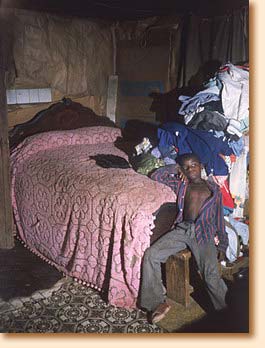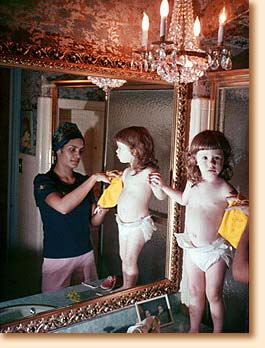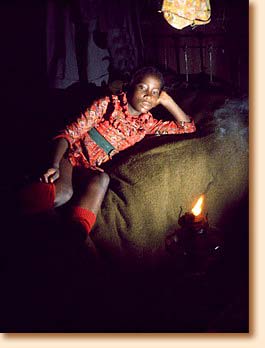

"... visually powerful....intense
impact.....No one can gaze upon his pictures without agreeing that such
poverty and despair should not be countenanced."
New York Times
"What makes American
Pictures so disturbingly powerful is the cumulative effects of Holdt's
photographs combined with his outsider's analysis of the dynamics of poverty
and oppression in the U.S."
Los Angeles Times

"A masterpiece!....
American Pictures is worse than any horror film - an unsettling mixture
of "The Lower Depths," "On the Road" and the "Book
of Revelations."
Few movies have ever been so suffused with lumpen misery....America's
preferred watching may well be the self-congratulatory TV shlockumentary
"Life Styles of the Rich and Famous", but the mirror is cracked
and incomplete without Holdt's appalling "life styles of the destitute
and denied."
The Village Voice
"The show is guaranteed
to assault the sensibilities of most Americans. However aware they may
be about poverty in the U.S., few will be prepared to see the level of
squalor, fear, and violence that Holdt's pictures reveal as an everyday
reality for a sizable minority of Americans."
Humanity and Society: Journal of Association
for Humanist Sociology
"Spellbinding...
stunning...... haunting......awe-inspiring. Holdt's analysis of the structures
of racism in America is so powerful as to "strain credibility,"
but his photographs validate his words, "sweeping us up in the process."
There is a vividness, a compassion and caring for the individual rarely
found among social scientists and journalists. A Hollywood producer could
popularize Holdt's story, and, with a big-name star, make it into an instant
"schlock-buster."
National Catholic Reporter

"American Pictures
will haunt you for days after seeing it. It will possess you emotionally
and intellectually. Everyone should see it, everyone who cares about the
condition of America and Americans.
It is shocking, frequently violent, and often horrifying. American Pictures
strikes you and challenges you to strike back. It demands that you act.
Holdt forces the audience not only to examine the presentation but to
examine themselves. In this sense, it is an absolute success."
The Chicago Reader
"..... utterly
stunning - a comprehensive story of America's racial scene, at once powerful
and disturbing. The length of this film only serves to strengthen the
far-reaching portrayal of its subject -- poverty in America, its pathos
and humor, its irony, its immense impact on the national psyche.... an
unusual, powerful document."
San Francisco Chronicle
"To put on the
shelf next to Let Us Now Praise Famous Men by Agee and Evans."
New York Post
"The emotional
clout of this documentary rests on the adaptability of still photography
to the illustration of contrast. It clues the viewer to a more subtle
level of contrast: as well: as the psychological and cultural differences
that separate the oppressed from the oppressors."
This is a deeper analysis of the benefits of using still photography in
a documentary.
Afterimage
Racism has come to stay. Therefore, it
becomes crucial that we learn to live with it as the disease it is. The
Directorate of Immigration is wise to bring Jacob Holdt back and
involuntarily commit the Norwegian people on his divan. We know that
there is a life-threatening virus in circulation that we are all
infected with. There is hardly any better vaccine than an evening with
Jacob Holdt. Should anyone oppose, we can just tell them that there is
nothing to be afraid of. Remember, they do it in America.
Aftenposten, Norway
"American Pictures
- a series of postcards from hell......embodying the qualities of Rimbaud,
Kerouac, and Kierkegaard - is a bizarre, disturbing work whose graphic
intensity makes Robert Frank's once-suppressed photos of the thirties
(The Americans) seem like images of an upper-class tea party."
American Film
"American Pictures
is one of the most incredible chronicles of the modern age you are ever
likely to see... beyond a doubt the most devastating and uncompromising
indictment of discrimination I have ever encountered."
Vanguard Press, Vermont

"It is a horrifying,
at times touching, portrait of the underclass as well as a journal of
his own emotional odyssey."
The News & Observer, Raleigh, NC
"What I saw with
Jacob astounded me. I saw communities that had been excluded from society
for generations. They were sinking deeper and deeper into poverty and
hopelessness under the weight of structural racism."
Anita Roddick, owner of The Body Shop, writing about
her travels with Jacob Holdt
Review by Christoph Ribbat " Hunger and Closeness:
Jacob Holdt"
in
Steidl's book
"Jacob Holdt: United States 1970-75"
"Not since Jacob
Riis' book of social criticism "How the Other Half lives" has
the been as powerful a record of American living as American Pictures.
Its presentation at the Cannes Film Festival created a sensation."
The San Francisco Film Festival
Selected as Outstanding Film
of the Year by the London Film Festival and for special presentation in
the Smithsonian Institution in Wash. D.C.